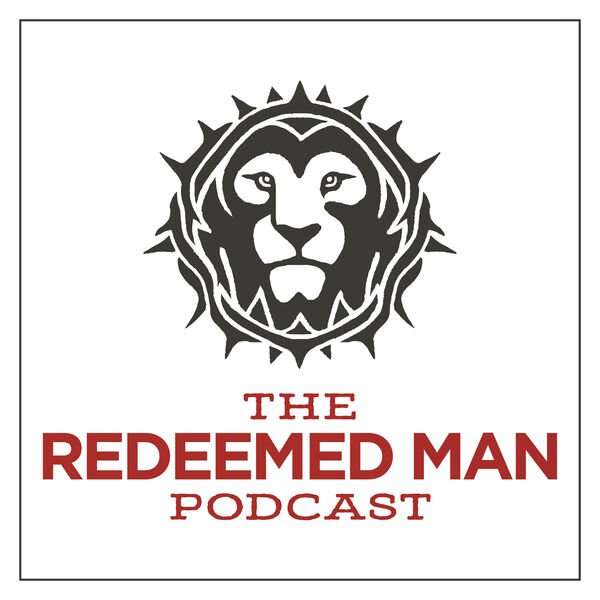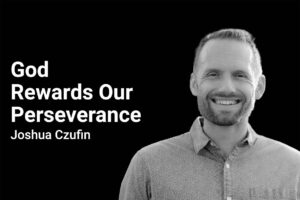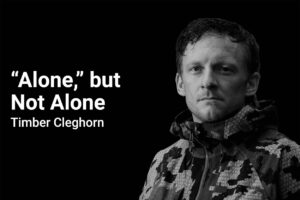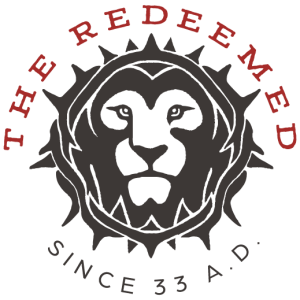Restoration: Practical Restorative Practices

More About The Podcast
- About
- Show Notes
About The Podcast
This month’s speaker is Bart Scarborough, founder of Ancient Way Farm, a west Georgia retreat where ministers and other religious leaders can find the peace and quiet needed to experience spiritual growth and renewal. Citing studies indicating that 70 percent of ministry leaders deal with depression and half would leave their jobs if they could, Scarborough says it’s vital for those leaders to examine the “healthy rhythms” of Jesus Himself, who set aside time for solitude and stillness even as he preached to entire nations. “In our culture, we have decided, ‘No, we are limitless, we can just go nonstop,’ ” he explains. “But that’s not how we were designed, and it’s not how Jesus modeled living. We want people to stop and pay attention to Jesus’ life, and then to walk in that path, not run around like a chicken with your head cut off—then you will find rest for your souls.”
Show Notes
Welcome and Guest Introduction
Good evening and welcome. My name is Paul Amos, and I’m the founder of The Redeemed. The Redeemed is an online community built for men to come together and allow them to share both their struggles in life and their triumphs of overcoming those struggles.
Today we bring to you another round of our Pursuing Restoration, a webcast that allows us to talk to special members of the community about all forms and brokenness and how we can use the life of Jesus Christ to heal our wounds.
Today, I have a very special guest, Mr. Bart Scarborough, to speak on the topic of restoration.
What does the word “Redeemed” mean to you?
Bart Scarborough: The word redeemed, I think what comes to my mind when you say that is, I think about that old hymn, ‘I once was lost, but now I’m found.’ I know Jesus said, This is why I’ve come, which is probably something worth pay attention to. This is why I’ve come to seek and save the lost.
We are like sheep, have gone astray and gone our own way. We’ve wandered off and we need the good shepherd. We need Him to come after us and to bring us home in to redeem us. We need Him to introduce us back to The Father, we need Him to give us a new name, a new identity.
So when I think about that word, redeemed, that’s the picture that really comes to my mind. This lost soul coming home, and then God given me a new identity.
Paul Amos: For so many members of our audience, I think that it’s lost on the fact that redemption is something that God’s already done for us. In reality, I think most men come to this ministry with the belief that either things they’ve done or things that have happened to them or how life has turned out for them, is so often something that there is shame associated with, there are troubles associated with. One of the beauties of what I think of being redeemed is the fact that God tells us that he’s already done it for us, that He swept away all of that and he’s brought it to us.
I have to say that Bart and my paths aren’t necessarily congruent, in that I took the very distant path from the Lord and you’ve taken a very congruent path to Him and always being connected to God from high school and college, and then in your ministry. I would love it if you spend a minute and just talk about how you got into the place of talking about restoration and a little bit of your background and your story.
Young Life Ministries
Bart Scarborough:
I was on Young Life staff for 25 years. That’s a long time in youth ministry. I began to get pretty worn out and tired. When you’re giving your life away and you’re not really protecting your soul a ministry can eat you each up. After a long time, we ended up deciding that it was time to do something different.
We left staff, we sold everything we had, we bought an RV, and we hit the road for 16 months. We hit the lower 48. We hit 27 national parks. Really, our idea was we needed a long sabbatical and we needed to pull in as a family. We needed to unplug and get off the grid for a while. And it was the best thing we’ve ever done.
It really was good for our souls to be able to slow down. That stopping and that slowing down and that getting off the hamster wheel is what has guided us to the place we are now.
The Start of a New Ministry
The last 10 years or so on Young Life staff we started doing more and more caring for those younger staff. We started doing more and more soul-care work, spiritual formation. As we were on the road and praying about what was next, it became pretty clear that the Lord was calling us into that type of ministry. So, we started the ministry called Ancient Way Farm.
It’s not really farming. It’s more ministry, but I like the sound of the name. It comes from that verse in Jeremiah 6:16:
Stand at the crossroads and look;
ask for the ancient paths,
ask where the good way is, and walk in it,
and you will find rest for your souls.
That had been our family verse for a few years before we hit the road. As we were praying, it seemed like that verse and the idea behind that verse of finding rest for your souls, it sounded like something we wanted to be involved in. It was like the Lord just kept pointing us in this direction. Clearly. He was calling us to this next season to provide a place where others could find rest for their souls, but they would have to stop to stand and look at the crossroads.
At the Crossroads
You have to stop. You have to pay attention. You have to take some inventory. And then you have to ask for the good way, the ancient path, which we were saying was the way of Jesus. And then it says walk in it. Which is not easy to do in this day and age, in our fast-paced world. But if we could do those things and we could find rest for our souls.
Ancient Way Farms
So we’ve opened a little retreat center for folks to come get off the grid for a bit and find rest for their souls. We want to provide a place for you to unplug, a place for you to can come to a pace where you can really be still and know that He is God.
Be still, and know that I am God.
Psalm 46:10
Well, there aren’t many places in America to do that. There aren’t many places in America that would even affirm that idea, but it’s biblical and it’s the way of Jesus. So we’re renting a property, 40 acres with a house, and t a cabin behind it. When you walk into that little cabin, no one’s saying, ‘Can I get the Wi-Fi password?’!
You walk in the cabin and you think, ‘Alright, this is the kind of place where I can be still. This is the kind of place that I could pay attention.’
One of the things we learned in 25 years with the Young Life is it was so important to get kids out of their environment. When they were at home, there are all these distractions, but if we could get them out of their environment and when we took them away to camp, we always would take their cell phones for a couple of days so they could really be still, they could really pay attention to what God might have for them.
So, our place at Ancient Way, it feels like that to me. Like we’re getting adults (we’re getting lawyers and teachers and bankers and people in full-time vocational ministry), we’re getting them out of the office, and we’re giving them a space to be still and pay attention to what God might have for then.
The Life and Work of the Soul
Timestamp: 11:03
Q: Paul Amos: Well, I’ve got four kids, three boys and a girl. All 18 and under, one about to graduate. And I think about all four of them with a phone, as sad as that may be, and I think about the fact that the world is saying to them and pressing upon them faster and faster is better and better. How are you able to help fight that trend? What message do you send to people that his is counter-cultural, but the right thing?
A: Bart Scarborough: It is very counter-cultural. I think what we’ve tried to do is remind people that the life of the soul, the work of the soul is a slow growth. Conversion could possibly happen quickly, but maturing, growing up…. that never happens quickly. That is a slow growth. If we could begin to value that, if we could begin see how important it is, then I think we’ve become a little more interested in, ‘Okay, maybe I do need to unplug for a bit, maybe I do need to sit down with the family. And everyone put their cell phones in another room and have a meal.’ Those things become a little more important.
I guess what we’ve been trying to do is say, ‘This is good work, this is holy work. This is the work of Jesus.’
If you haven’t seen The Chosen, I would highly recommend it. It is a TV series on the life of Jesus. One of the things I’ve loved about it is, you see the pace of their life. Jesus was very busy because the whole town would come and he would have to heal all these people. But the next day, they are on a 10 mile journey slowly walking through the desert and having these deep conversations. The next day he’s slipping away to the mountainside to be alone with his father. Then there are several instances where no one can even find Jesus.
Jesus comes back and says, ‘I’m sorry, I know things are about to get busy, and so I’ve gone away to be with my father.
That rhythm that he shows in the scripture, is what we’re trying to encourage others to value, to see, and to follow.
Struggling With the Pace of the World
Timestamp: 13:53
Q: Paul Amos: When someone shows up at Ancient Way Farm, do you find that they are burnt-out? Do you find that they are struggling with the pace of the world? Are they already in a place that they don’t need to be convinced about the fact that a different way is the better way?
A: Bart Scarborough: Yes, most of the people that come retreat with us are waving the white flag.
Most of the time we are not seeking out people and convincing them that they need to slow down. Often, we have people coming to us, knowing that they are in big trouble. That they can’t keep up.
They know they’ve lost some intimacy with Jesus. The red flags are coming up.
We got an email yesterday, I said, ‘I realize I’m out leading Jesus. I’ve gotten out of order. And I’d like to come and sit with you all and be still with the Lord and remember the right order.’
A lot of people that are retreating with us really are saying, I need help and I need something different.
Spiritual Formation
I use the phrase spiritual formation earlier, maybe out to define that. My favorite definition comes from Robert Mulholland who says that spiritual formation is the process of being conformed into the image of Jesus for the sake of others. I really like this idea that conversion can happen quickly, but formation, being formed in the image of Jesus, that doesn’t happen quickly. It’s a process.
Being conformed, my picture is kind of a potter in the clay. That there’s this outside force doing the work, He is forming us into the image of Jesus. But there’s always this comma, and we’re doing this work, the soul care work, as below the surface work, we’re always doing it for the sake of others, so we can serve others.
So at Ancient Way Farms, we’re doing some practices that help with that. Everything from slowly reading the Bible, to the daily reading, reading scripture in different ways. We’re having slow walks together. We’re having a lot of hospitality and meals together.
Sometimes people want to have conversation, but a lot of times people want to have solitude. One of the things I love about this model that we have set up is…. We can do that!
My lovely wife, Victoria, and I have said we want to stay intentionally small so that we could be intentionally relational.
We’re doing something a little different. We’re trying to have much more intentional one-on-one, looking at what’s going on in your heart and soul, and try to usher you before the Lord while you’re with us.
Time at Ancient Way Farms
Timestamps: 17:56
Q: Paul Amos: How do you balance the structure of a time with you between the times of solitude? Do you keep it free form?
A: Bart Scarborough: One of our board members described this decision as a “cup of coffee conversation.” By that she meant when folks arrive, you’re having a cup of coffee and you pray, and you seeing what the Spirit might stir up. And that’s kind of how we’ve done it.
Some people come to saying, ‘Hey, I’d like to have three days of solitude.’ And some people come and say, ‘Hey, I have a lot of questions.’ Typically, our sweet spot is somewhere in the middle with blocks of solitude and times for conversations. We really lean heavily on God to lead us on where we should go.
Unique Needs of Those in Ministry
Q: Paul Amos: You mentioned earlier when you talk about your time at Young Life, that ministry can be really weigh heavily on you. One of the things I’m curious about is when you have people come in, I can imagine what it’s like for someone to come in who’s strung out, tired, in need of restoration. What is it like to administer to the people in the ministry?
A: Bart Scarborough: I think one of the things that’s unique for people in ministry is most of them don’t have a safe place. They are the minister! People think they’re not going to have any problems, they have it all figured out. We are in a unique position to understand, because of those 25 years with Young Life, the people in the ministry desperately need a place where they can be honest and real.
Those in the ministry bear a pretty heavy burden because they’re having to hold it all together. A lot of people in ministry that are coming in are pretty burnt-out. Especially right now with COVID. There are so many factors that are affecting people in ministry, and it’s been difficult.
Most of the ministers I’ve been talking to say their counseling load for their parishioners is four or five or six times what it normally was before COVID.
Our goal is to give them a place where they can restore their soul, give them a place where they can maybe get healthy, so then go back and do ministry .
Timestamp: 21:42
Q: Paul Amos: How do you encourage people and what kind of tools do you give visitors or what kind of encouragement do you give to sustain the restoration outside of the time they’re spending with you?
A: Bart Scarborough: One is that caring for their soul is important. Which sounds crazy, right? You would think that with everyone in ministry that should be ingrained, but a lot of times people will go, think ‘I’m going to be out there of caring for others.’ and forget to take care of themselves.
If you don’t have something, you don’t have anything to give away. So, we help them understand that feeding yourself is important, and that they need to make sure it is a priority in their life, so that they will be healthier for their congregation.
Another thing we do practices with folks and encourage them. If they like them, we encourage them to take them home. For example, if we’re having a quiet time and it’s better for us maybe to be outside in nature while we do that; then why don’t you go outside of nature and spend a whole time of the Lord? If sitting in the corner and reading your Bible doesn’t fit, don’t do that. Let’s figure out something else.
We are trying to give them some practices to try on for size. Hopefully, there might be one or maybe two that embrace and we encourage them to continue those practices that work for them from home.
Small Ways to Be Mindful of God’s Presence
Q: Paul Amos: Is there a combination of micro and macro tools that work best? In the sense that what you’re talking about is getting away for several days (macro), and at the same time, I’m hearing you talk about the small moments (micro) you really need in the day to day.
A: Bart Scarborough: I think what I’ve learned is that old formula of the quiet time. You spend some time with the Lord. I think in the old mindset I had was I would get up in the morning and I would read my Bible and I would pray, and then I would go about my day and try not to sin.
I think what I’m trying to do different is be present to the one who’s present with us. I’m trying to be mindful of the God of creation who dwells with me throughout the course of the day.
I think about Brother Lawrence’s book, The Practice of the Presence of God. All throughout his day, he is washing dishes, but he’s mindful that God is with him. All throughout the day, he’s paying attention.
I heard this wonderful podcast, where a guy encouraged us to pray that we could cultivate an awareness of God’s presence throughout the day. So instead of having this one God moment for 20 minutes in the morning, take time throughout the course of the day to be mindful of God. That’s what I’ve been trying to do on the micro-level, encourage others to do the same thing so that we’re not just we’re not just trying to be good during the day.
We’re actually living in this relationship with the living God throughout the course of our day, and we’re present.
There are lot of different tools we can use. John Eldridge with Wild at Heart, has a One Minute Pause App, to reconnect with God in the midst of your busy day.
I will often sit with my hands empty and opened wide to remind me to let go of some of the things I’m clinging to. I’m always kind of looking for ways just to be mindful of his presence.
Nature and Restoration
Timestamp: 27:32
Q: Paul Amos: Tell us about that connection and the importance of nature in the restoration process?
A: Bart Scarborough: I think it’s so important to be in creation. There’s something good for our souls. When we are the creation, it always seems to point us to The Creator. Getting out side in nature it is just restorative to the soul. I’m a big proponent. Of course, not everyone’s wired that way. But I do think getting outside is so helpful.
One of the things that Victoria, my lovely wife and I try to do is in the morning before we even have breakfast, is just get outside for a little while. Listen to the birds. I think it’s important to be outside and see the beauty of God’s creation.
Staying Restored Personally
Timestamp: 31:38
Q: Paul Amos: While you’re out trying to help so many people, how did you yourself stay restored?
A: Bart Scarborough: We’ve learned to say no.
A friend of mine said he thinks the Lord has called us to do Ancient Way Farm for this season, because all of that is going on with our country. All the hurt, heartache, the need is so great. But we can’t meet all that need, and so learning to say no, it’s been a really powerful tool to protect our souls.
We’re booked up for most of the summer already because we’ve decided to run our retreat center a little different than most North American retreat centers. Most retreat centers might have you coming in and then leaving by noon, so they can flip the room over and have another group coming in by 2:30, and it’s just non-stop.
We’ve tried to set up some healthy rhythms. Plenty of time to get the grass cut. Plenty of time to After we have taken a few days to really hold people’s stories that are treating with us, we’re pretty rest. So we’re really build that into the schedule and that’s been life-giving.
We’re not saving near as many people as we could, but we know just like we’ve seen in the course of years of ministry, when we don’t say no, and keep trying to meet every need, will burn out.
We can live with no limits, but that’s not how God designed us. We would put some things in place to remind us that we’re not God and we can’t do it. We desperately need him, so we’re trying to live at a healthy pace, and in a healthy manner, so that
Impact of Ministry on Kids
Timestamp: 34:37
Q: Paul Amos: You homeschool your kids, and you have a big influence on their lives. How has this ministry impacted your two kids? What do you see happening in them as a result of all of this coming into your home, being a part of it, what’s life like for them and what are they seeing in their parents?
A: Bart Scarborough: When we were on the road trying to figure out what was next, we decided we wanted to do something together.
And we came up with a lot of different ideas. We had this notebook and we wrote down a lot of things, and we kept marking through all these different ones, but this idea of Ancient Way Farm stuck and it’s something we can do together.
It feels a little bit like a Young Life Camp where the kids are part of the work crew. My daughter who’s 16, she’s an amazing cook and baker, and so she helps a lot with the meals for our guest. My son is old enough now that he’s helping me weed eat and cut the grass. So they are getting to be a part of it.
And generally, when people leave, one of the things they say is, this was wonderful, and this is wonderful, but the thing that might have been the most impactful was being involved with your family.
Sitting at the table with your family, having your son ask us questions at the table, this conversation that happens at the table with the whole family, and they’re a part of that.
We are all in. We’re all praying for our guests. We’re praying for financial resources to come in, we’re praying that God will work.
Search Podcasts
Enjoyed This Episode?
Discover more inspiring episodes of The Redeemed Man Podcast wherever you tune in!
Share This Podcast
Sign up for updates
When you sign up for this mailing list, you’ll receive regular updates for The Redeemed.
More From The Redeemed Man Podcast

See the Emotion Behind the Behavior
Pastor, author, and mental health advocate Will Hutcherson unpacks the science behind teenagers’ anxiety and emotional outbursts—and equips dads with practical tools to connect with their kids more deeply and compassionately.

God Rewards Our Perseverance
Colorado pastor Joshua Czufin talks with Nate Dewberry about pushing through personal hardship and moving past hesitation to fully engage in spiritual communities.

“Alone,” but Not Alone
Having spent three months in the Canadian Arctic on the survivalist reality show Alone, Timber Cleghorn shares what he learned about God, himself, and finding peace.









